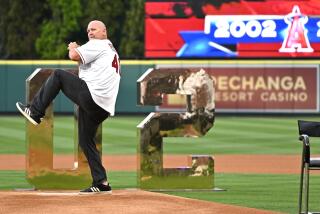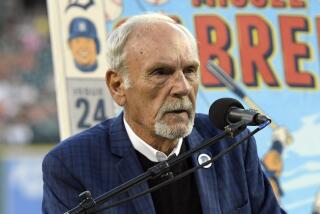Manager Brundage has Simple Formula for Success
- Share via
LANCASTER — JetHawk Manager Dave Brundage sits in his office and describes how, despite playing five years in triple-A baseball, he never made the major leagues, and asks himself a rather obvious question.
“Does it make me bitter?” he said. “No. People ask me that sometimes: Am I resentful I didn’t get a chance in the big leagues. I say no. I played the game the way I was capable of playing. I did the little things. I didn’t do anything above average.
“Except maybe I was a very good student of the game.”
Which is why Brundage, 31, is in his second season as a minor league manager. He was the youngest manager in professional baseball last season when he was at Riverside, earning positive reviews from those above and below him in the Seattle Mariner organization.
“He handled himself very well in the Cal League [last season],” said Larry Beinfest, Mariner director of player development. “We are excited about his future managerial possibilities.”
JetHawk pitcher Ivan Montane, who played for Brundage last season, said, “He’s a great guy. He’s what you’d call a player’s coach. . . . You play relaxed baseball around him. There’s nothing better than playing relaxed, and a manager can put pressure on you.”
It’s simple to Brundage. Treat the players the way he wanted to be treated when he was playing, which wasn’t long ago.
“The No. 1 rule I always manage by is I hope to never forget what it was like to be a player,” he said. “I hope I never lose that. You don’t want to yell and scream and embarrass a kid, because I knew I didn’t want to be embarrassed out there.”
Brundage played seven minor league seasons for the Philadelphia Phillies and Mariners, mostly as an outfielder, though he was converted to a relief pitcher in one final attempt to resuscitate his career.
The closest he came to the major leagues came in 1992, when an injury created an opening in the Mariner outfield. Apparently, someone on the Mariner field staff decided Brundage would be called up, so all of Brundage’s friends on the team started calling him in Calgary and preparing him for the good news.
But it never came. He’s still not sure what happened.
“I guess somebody in a high position vetoed it,” he said.
Many of Brundage’s other baseball memories are from the lone major league spring training camp to which he was invited. Actually, he invited himself.
Brundage sent a Christmas card to Mariner General Manager Woody Woodward saying, “All I want for Christmas is an invitation to big league camp.”
Woodward didn’t reply, so Brundage simply showed up for major league camp in Arizona, prepared to pay his own expenses if the team wouldn’t. Finally, Woodward relented and extended an invitation to Brundage.
That spring Brundage started in the outfield against the Oakland Athletics and Dave Stewart on Opening Day. Well, the opening game of spring training, that is.
Brundage was a career .275 hitter in the minors. As a relief pitcher, he was 1-5 with a 3.51 earned-run average and three saves in 51 innings spread over seven seasons.
As players went, Brundage looked like a heck of a good manager. He showed up early, left late, and kept one eye on the field and one on the manager at all times.
“He was kind of a student of the game while he was playing,” Beinfest said. “You could tell the last few years of his playing career that he almost assumed a player-coach personality without even having the title.”
After the 1994 season, when he finally picked up the title of player-coach with the Mariners’ triple-A team in Calgary, Brundage reached a rare point in a baseball player’s career: He had choices.
The Mariners told him he could stick around as a pitcher, though he realized he had little chance of making the majors in that capacity, or he could become a manager at rookie-level Peoria in the Arizona League, the lowest rung of the organization.
That was the off-season of the strike, allowing Brundage another option. He said about 20 clubs made lucrative offers for him to become a replacement player.
Brundage says he knew replacement ball would be a sham, and despite the short-term financial reward, it would jeopardize any shot he had at making the majors as a manager.
So Brundage accepted the Peoria job. Shortly before the season, Ken Griffey Sr. abruptly left his job as a hitting coach in the organization, creating a ripple effect that bumped up several coaches in the system.
Instead of managing at Peoria, a team of raw teenagers that plays in front of virtually empty stadiums in 100-degree heat, Brundage was moved to Riverside, the third-highest of the Mariners’ six minor league teams.
“It was probably the first good break I’d ever had,” Brundage said.
Brundage led the Pilots to a 72-67 record and a berth in the Cal League playoffs last season. Reassigned to Class A this year, he has continued to show he has a firm grasp on his job: Not only to win, but to develop players for the majors.
Through the early weeks of this season, Brundage has allowed players to try different positions, and to hit in situations in which other managers might not give them a chance: Like a left-handed batter against a left-handed pitcher in the late innings.
Not long ago Brundage was a minor league left-handed hitter who was often pulled in such situations, and it might be one of the reasons he never fully developed. Brundage doesn’t want to let that happen to any of his players.
“If I couldn’t make it as a player, I’d sure like to make it as a manager,” he said. “And if I can’t make it as a manger, I’d sure like to see my players go on to the major leagues.”
More to Read
Go beyond the scoreboard
Get the latest on L.A.'s teams in the daily Sports Report newsletter.
You may occasionally receive promotional content from the Los Angeles Times.










